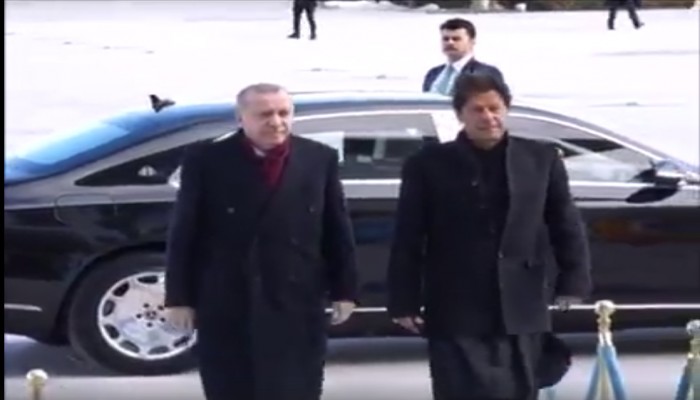Shared pan-Islamist dreams make a Turkey-Pakistan nuclear nexus possible
- In Foreign Policy
- 11:07 AM, Dec 15, 2019
- Divya Kumar Soti
In the aftermath of 9/11 terror attacks, Sibel Edmonds, an expert in Turkish and Farsi, was hired by the FBI to listen to and translate intercepted conversations. Edmonds would later turn a whistleblower and testify before US Congress in a closed door hearing, proceedings of which are still classified. In 2008, Edmonds revealed to the Sunday Times how Turkish intelligence and diplomatic operatives were acting as conduits for Pakistan’s secret service for extracting sensitive information regarding nuclear weapons technology from US nuclear facilities including the premier Los Alamos nuclear laboratory in New Mexico. Edmonds told Sunday Times that “there were several transactions of nuclear material every month, with the Pakistanis being among the eventual buyers.” Edmonds said that “the Turks acted as conduits for the Inter Services Intelligence (ISI), Pakistan’s spy agency, because they were less likely to attract suspicion.” (1)
What Edmonds has been saying has some corroboration from facts revealed during international investigation into nuclear blackmarket network used to be run by Pakistani scientist AQ Khan who is also known as the father of Pakistan’s nuclear bomb. Turkey is understood to have acted as an “industrial hub” for Khan’s nuclear smuggling activities with many Turkish companies aiding his network “by importing materials from Europe, making centrifuge parts and shipping finished products to customers.”(2)
Fast forward to October 2019, Turkish President Erdogan tells a gathering of Turkish political elites that Turkey is looking forward to acquiring nuclear weapons. Erdogan’s statement has only added to west’s longstanding suspicions about Turkey’s ambitions of developing a military nuclear programme and about it being the secret fourth customer of AQ Khan network. However, there has been a conspicuous silence from the West about Turkish nuclear activities which is in clear contrast with corresponding belligerence and hyper-activity seen in case of Iranian nuclear programme. No serious efforts were made during the investigations into AQ Khan Affairs to trace the consignment which while being shipped from Malaysia to Libya went missing en route and was suspected to have landed in Turkey. (3)
Substantial part of AQ Khan matter was hushed up to suppress the inconvenient truths and only the facts about his smuggling transactions with Iran and Libya made it to the international headlines. Even after Erdogan’s latest statement against the NPT regime, no western leader has cared to speak. Western strategic circles are mostly busy debating what to do with American nuclear weapons stationed at an airbase in Istanbul in case Turkey’s breaks out from NATO.
As Erdogan seeks to establish what Islamists see as the neo-Ottoman empire, he cannot find a more natural ally than Pakistan, a country in whose birth the craving to revive the Ottoman Caliphate played a historic role. As the Ottoman empire collapsed after the defeat of axis powers in World War I and office of Caliph based in Istanbul was abolished, Khilafat movement was started in British India to get the Caliph’s office restored. Abolition of the office of Caliph was largely seen as a Christian conspiracy against Islam by the orthodox ulema across the world and in India too these clerics spearheaded a movement to get it restored. This Khilafat movement was supported by Mahatma Gandhi, then a rising star in Indian politics in the hope of achieving ulema’s support for united Hindu-Muslim struggle for India’s independence. However, the unforeseen side effect of this game plan turned out to be that a substantial section in the Indian Muslim community started to identify with pan Islamic sentiments. As Husein Khimjee observes, “the abolition of the institution of the Khilafat (Caliphate) in Turkey and the reasons given by the Turkish ulema for its abolition, provided food for thought to the Muslim elite in India. Muslims saw in the reasons for this abolition a process of critical theological reasoning in which it was possible to update the institution of the Caliphate. This reflection made it possible for Muslims to demand, from the British government and the Indian National Congress, an Islamic state.”
Thus, though the Khilafat movement failed to achieve its stated objectives, it did end up mobilising Indian Muslims on communal lines and this mobilisation was later used by Muslim League leaders, founders of which included leaders of Khilafat movement, to first secure separate electorates for Muslims and then carve out the Islamic State of Pakistan which later went on to develop “the Islamic nuclear bomb”. No wonder Erdogan in view of his pan-Islamist agenda has made wooing Indian Islamists a cornerstone of his foreign policy. (4)
In addition to Erdogan’s nuclear ambitions, the growing synergy between Pakistan and Turkey also has to do with former’s worsening geopolitical relations with Saudi Arabia and the UAE. For years, Saudis have been suspected to have a secret understanding with Pakistanis to supply them with nuclear weapons in case the Shia Iran turns nuclear. However, they grew suspicious of Pakistan’s reliability since the time when Pakistan’s national assembly resolved to decline Saudi request to send Pakistani troops to join Sunni war efforts in Yemen against the Houthi Shias who are backed by Iran. Since then Saudi Arabia and the UAE’s relations have exponentially improved with India and they are pumping huge investments into the Indian economy. Saudis even went to the extent of supporting abolition of Article 370 from Jammu and Kashmir by India, leaving Pakistan red faced before the international community (5). This has naturally brought Pakistan closer to Turkey which happens to be Saudi Arabia’s main competitor in the Muslim world. So, Turkey’s support to Pakistani propaganda on the abolition of Article 370 is just a collateral effect of larger geopolitics at play.
Erdogan’s nuclear ambitions coupled with his neo-Ottoman revivalist project coming in synergy with the jihadist designs of Pakistani rogue nuclear state are all set to have a destabilising influence on international security.
References:
- https://www.thetimes.co.uk/article/for-sale-wests-deadly-nuclear-secrets-b8ndvzj33jj)
- https://www.nytimes.com/2019/10/20/world/middleeast/erdogan-turkey-nuclear-weapons-trump.html
- https://nationalinterest.org/feature/turkey-secretly-working-nuclear-weapons-13898?page=0%2C1
- https://www.timesheadline.com/opinion/erdogans-dangerous-game-wooing-indian-muslims-7173.html
- https://timesofindia.indiatimes.com/india/saudi-arabia-understands-indias-approach-action-in-jk-as-ajit-doval-meets-saudi-crown-prince/articleshow/71407005.cms







Comments